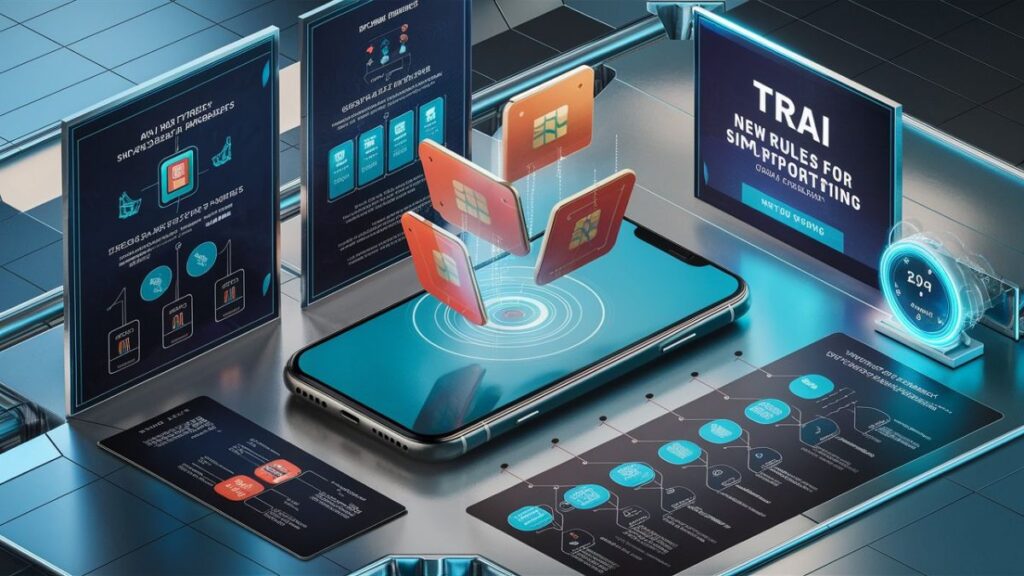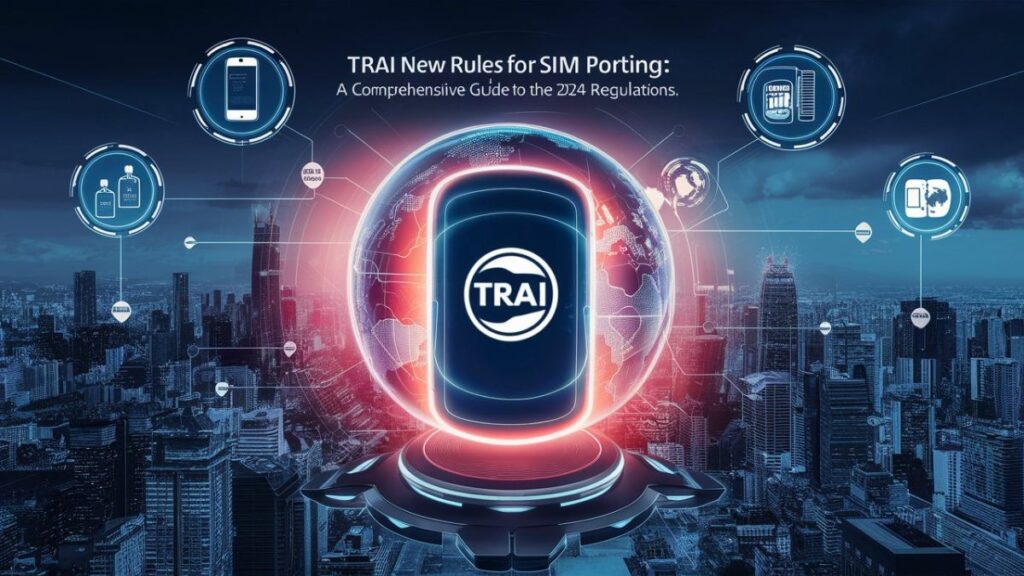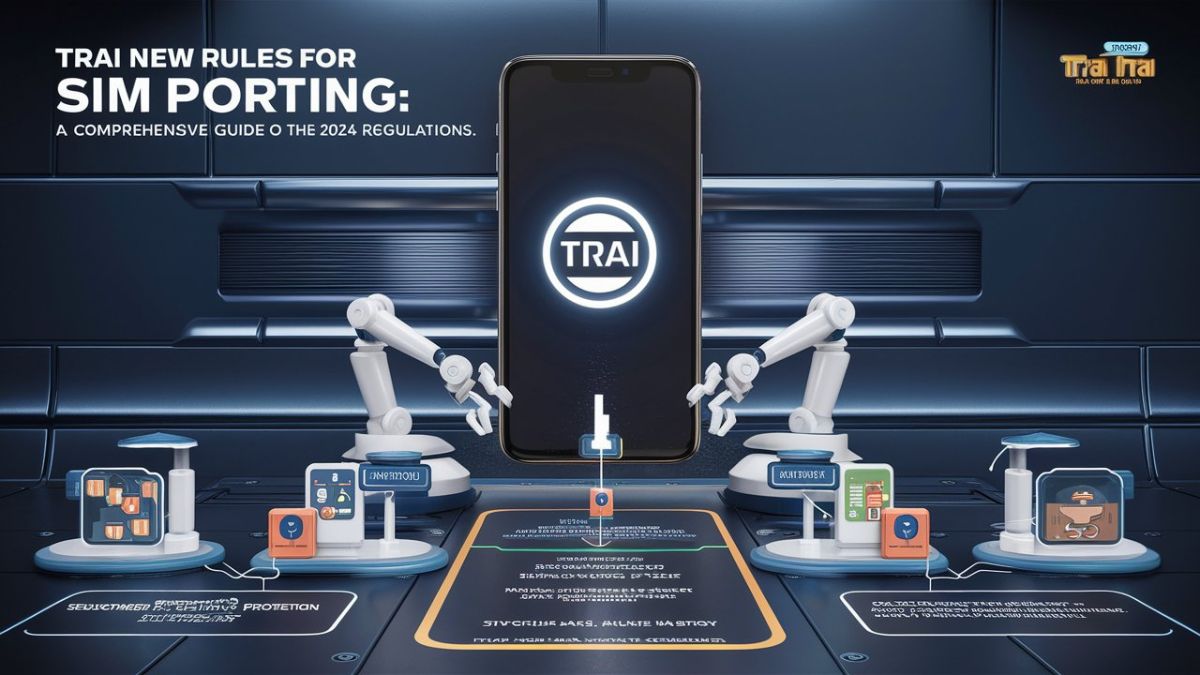TRAI New Rules for SIM Porting: The Telecom Regulatory Authority of India (TRAI) implemented new rules for SIM porting, marking a significant change in the mobile number portability (MNP) process. These regulations, announced in March 2024, introduce a seven-day waiting period for users who have replaced a lost or faulty SIM card before they can switch service providers. This blog post will delve into the details of these new rules, their implications for mobile users, and the rationale behind TRAI’s decision.
Understanding SIM Swap and MNP
Before we dive into the new regulations, it’s essential to understand two key concepts:
- SIM Swap: This is the process where an existing subscriber obtains a new SIM card to replace a lost or non-working one.
- Mobile Number Portability (MNP): This service allows users to retain their mobile numbers when switching from one service provider to another within the country.
The New TRAI Regulations: What’s Changed?
The primary change in the new regulations is the introduction of a seven-day waiting period after a SIM swap or replacement before a user can initiate the porting process. This is a reduction from the previous ten-day period.
Key points of the new regulations:
- Seven-day waiting period after SIM swap or replacement
- Rejection of Unique Porting Code (UPC) requests within this period
- Aimed at combating fraudulent practices in mobile number porting
The Evolution of MNP Regulations
The Telecommunication Mobile Number Portability Regulations, first introduced in 2009, have undergone nine amendments to improve the MNP process. The latest amendment focuses on enhancing security and preventing fraudulent activities.
Timeline of MNP Regulation Amendments:
| Year | Amendment Focus |
|---|---|
| 2009 | Initial MNP regulations introduced |
| … | Various improvements to the MNP process |
| 2024 | Introduction of seven-day waiting period post SIM swap |

Stakeholder Feedback and TRAI’s Decision
TRAI’s decision to implement these new rules came after careful consideration of stakeholder feedback. The regulatory body had to balance different perspectives:
- Some stakeholders supported a ten-day waiting period post SIM swap.
- Others advocated for shorter durations (e.g., two to four days), citing potential inconvenience to subscribers during urgent porting needs.
TRAI ultimately decided on a seven-day period as a compromise between security concerns and user convenience.
TRAI New Rules for SIM Porting: Impact on Mobile Users
These new regulations will have several impacts on mobile users in India:
- Increased Security: The waiting period helps prevent unauthorized porting through fraudulent SIM swaps.
- Potential Inconvenience: Users needing to port their numbers urgently after a SIM replacement will face a delay.
- Greater Awareness: Users will need to be more mindful of the timing of SIM replacements and porting requests.
The Process of Mobile Number Porting Under New Rules
To help users understand the new process, here’s a step-by-step guide to porting your mobile number:
- Replace your SIM card if necessary
- Wait for seven days after the SIM replacement
- Send an SMS to 1900 with the text “PORT” followed by your mobile number
- Receive the Unique Porting Code (UPC)
- Visit the new service provider with the UPC and required documents
- Complete the porting process with the new provider
Combating Fraud: The Primary Motivation
TRAI emphasized that these amendments are crucial in combating fraudulent practices associated with mobile number porting, particularly through unauthorized SIM swap or replacement activities. Some common fraudulent practices include:
- Identity theft leading to unauthorized SIM swaps
- Immediate porting after fraudulent SIM replacement to gain control of the victim’s number
- Using ported numbers for financial fraud or other illegal activities
Implications for Telecom Service Providers
The new regulations also have implications for telecom service providers:
- Updated Systems: Providers need to update their systems to implement the seven-day waiting period.
- Customer Education: There’s a need to educate customers about the new rules to prevent confusion and complaints.
- Fraud Prevention: Providers can use this period to implement additional security checks.
International Perspective: SIM Porting Rules Around the World
To provide context, let’s look at how other countries handle SIM porting:
| Country | Porting Time | Special Rules |
|---|---|---|
| USA | 1-3 business days | No specific waiting period after SIM swap |
| UK | 1 business day | 30-day waiting period for new connections |
| Australia | 3 hours to 3 days | No specific waiting period after SIM swap |
| India (New Rules) | 2-5 days | 7-day waiting period after SIM swap |

Potential Challenges and Criticisms
While the new rules aim to enhance security, they may face some challenges and criticisms:
- Inconvenience for Legitimate Users: The waiting period might be problematic for users who urgently need to port their numbers.
- Potential for Misuse: Fraudsters might find new ways to circumvent these rules.
- Implementation Hurdles: Telecom providers might face technical challenges in implementing these changes.
Future of Mobile Number Portability in India
As technology evolves and new challenges emerge, we can expect further refinements to the MNP process in India. Potential future developments might include:
- Integration of biometric verification for porting requests
- Blockchain-based systems for secure and transparent porting
- AI-powered fraud detection systems to identify suspicious porting activities
Conclusion
TRAI’s new rules for SIM porting represent a significant step towards enhancing security in mobile number portability. While they may cause some short-term inconvenience, the long-term benefits in terms of reduced fraud and increased trust in the telecom ecosystem are substantial. As mobile users, it’s crucial to stay informed about these changes and plan our telecom needs accordingly.
FAQs
Q: When did the new TRAI rules for SIM porting come into effect?
A: The new rules came into effect on July 1, 2024.
Q: What is the main change in the new SIM porting rules?
A: Users must now wait seven days after replacing a SIM card before they can switch service providers.
Q: Why did TRAI introduce these new rules?
A: The rules aim to combat fraudulent practices associated with mobile number porting, particularly unauthorized SIM swaps.
Q: How long do I need to wait after a SIM swap before I can port my number?
A: You need to wait for seven days after a SIM swap before you can initiate the porting process.
Q: What is a Unique Porting Code (UPC)?
A: A UPC is a code issued by your current service provider that you need to provide to your new service provider to port your number.
Q: How do I get a UPC for porting my number?
A: Send an SMS to 1900 with the text “PORT” followed by your mobile number.
Q: Can I port my number immediately after getting a new connection?
A: The new rules specifically address SIM swaps. For new connections, you should check with your service provider about any waiting periods.
Q: What documents do I need to port my mobile number?
A: Typically, you need a valid ID proof, address proof, and the UPC. Check with your new service provider for specific requirements.
Q: How long does the porting process take after submitting a request?
A: The porting process usually takes 2-5 days after submitting a request with the new service provider.
Q: Can I cancel a porting request after initiating it?
A: Yes, you can cancel a porting request within 24 hours of submission by contacting your current service provider.


What’s up mates, how is the whole thing, aand what you
would like to say aboout this post, in my view its in fact remarkable for me. https://Zeleniymis.Com.ua/
I was suggested this blog by mmy cousin. I’m nnot
ure whether this post is writtesn by him as
no one else know such detailed about my trouble. You are amazing!
Thanks! https://bikeindex.org/users/kjjx0ibs9kbptiz3rzsm1a
Attractive section of content.I just stumbled upon your site and in accession capital
to assert that I gett in fact enjoyed account your blog posts.
Anyway I’ll be subscribing to your augment and even I acievement you
access consistently rapidly. http://users.atw.hu/nlw/profile.php?mode=viewprofile&u=14362
Hello, I would like to subscribe for this website to take hokttest updates, so
where can i do it pplease help out. http://Molbiol.ru/forums/index.php?showtopic=1105785&st=0&p=3988854
Hello mates, how is everything, and what
you wiksh for tto say regarding this paragraph, in my view its inn fact awesome in support of me. https://uatronic.wordpress.com/
Monitoreo de condicion
Aparatos de ajuste: esencial para el funcionamiento suave y eficiente de las maquinarias.
En el ámbito de la innovación contemporánea, donde la productividad y la estabilidad del dispositivo son de suma trascendencia, los equipos de balanceo tienen un función fundamental. Estos dispositivos especializados están concebidos para ajustar y estabilizar partes rotativas, ya sea en dispositivos manufacturera, automóviles de desplazamiento o incluso en aparatos hogareños.
Para los expertos en conservación de dispositivos y los especialistas, operar con sistemas de ajuste es esencial para asegurar el rendimiento fluido y fiable de cualquier dispositivo móvil. Gracias a estas opciones avanzadas innovadoras, es posible disminuir notablemente las sacudidas, el zumbido y la carga sobre los cojinetes, aumentando la longevidad de piezas valiosos.
Asimismo importante es el función que cumplen los equipos de balanceo en la soporte al cliente. El ayuda técnico y el soporte constante empleando estos equipos habilitan ofrecer servicios de alta calidad, elevando la satisfacción de los consumidores.
Para los responsables de negocios, la financiamiento en sistemas de equilibrado y medidores puede ser esencial para mejorar la productividad y eficiencia de sus equipos. Esto es especialmente relevante para los emprendedores que dirigen pequeñas y intermedias negocios, donde cada aspecto cuenta.
Además, los sistemas de balanceo tienen una vasta aplicación en el área de la protección y el monitoreo de excelencia. Habilitan identificar posibles errores, reduciendo reparaciones elevadas y daños a los sistemas. Más aún, los resultados recopilados de estos equipos pueden usarse para mejorar métodos y potenciar la presencia en plataformas de consulta.
Las sectores de utilización de los aparatos de balanceo cubren numerosas industrias, desde la fabricación de vehículos de dos ruedas hasta el supervisión ecológico. No afecta si se considera de enormes producciones manufactureras o limitados locales hogareños, los sistemas de balanceo son fundamentales para proteger un desempeño óptimo y sin riesgo de fallos.
I keep listening to the newscast talk about getting boundless online grant applications so I have been looking around for the top site to get one. Could you advise me please, where could i get some?
I do not even know how I ended up here, but I thought this post was good. I don’t know who you are but certainly you’re going to a famous blogger if you are not already 😉 Cheers!
Very nice post. I just stumbled upon your blog and wished to say that I’ve truly enjoyed surfing around your blog posts. After all I’ll be subscribing to your rss feed and I hope you write again very soon!
Hi my friend! I want to say that this article is awesome, nice written and include approximately all vital infos. I’d like to see more posts like this.
I like the valuable information you provide in your articles. I’ll bookmark your weblog and check again here frequently. I’m quite certain I will learn plenty of new stuff right here! Good luck for the next!
Great paintings! This is the type of information that are meant to be shared across the net. Disgrace on the search engines for not positioning this put up upper! Come on over and talk over with my site . Thanks =)
excellent post.Ne’er knew this, appreciate it for letting me know.
Hi, I think your site might be having browser compatibility issues. When I look at your website in Safari, it looks fine but when opening in Internet Explorer, it has some overlapping. I just wanted to give you a quick heads up! Other then that, fantastic blog!
Helpful info. Fortunate me I discovered your web site unintentionally, and I’m shocked why this accident did not took place in advance! I bookmarked it.
You can definitely see your expertise within the work you write. The arena hopes for more passionate writers like you who are not afraid to mention how they believe. At all times go after your heart. “What power has law where only money rules.” by Gaius Petronius.
you have a great blog here! would you like to make some invite posts on my blog?